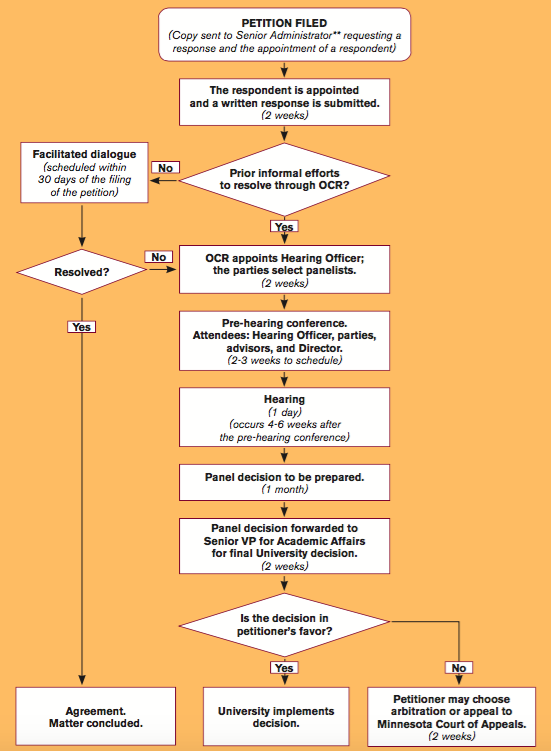The formal conflict resolution process is available for some, but not all, workplace disputes. Time limits apply, and are strictly observed. Any employee deciding whether or not to file a petition is encouraged to consult with the OCR for more information. A more complete description of the petition and peer hearing process can be found in the Conflict Resolution Policies and Procedures booklet.
Eligibility
Faculty, staff and student employees who are not members of a union may file a petition if they believe a University policy has been violated.
Former Employees
In certain circumstances, former employees may file a petition challenging the termination of their employment, or challenging other employment decisions relating to or arising from the termination.
Faculty
Complaints by a regular faculty member will be heard in accordance with the terms of Board of Regents Policy: Faculty Tenure. The Senate Judicial Committee takes original jurisdiction over some employment-related issues and defers to the conflict resolution process on others.
Faculty Emeriti
An emeritus faculty member may submit a petition only if the violation occurred prior to termination of employment or a written contract signed by an authorized University official during the employment period is violated after employment terminates. The remedy in such a case is limited to a financial remedy. A dispute arising under Board of Regents Policy: Faculty Emeriti may not be the basis of a petition.
Exclusions
Persons who are not employed by the University, even if their work is physically located here - for example, employees of University of Minnesota Physicians - are excluded from services.
Covered Subject Matter
An allegation of a violation of a specific University rule, regulation, policy or practice pertaining to employment is required. A petition alleging discrimination, including sexual harassment, may be submitted to the OCR or the University’s Office of Equal Opportunity and Affirmative Action (EOAA), but not to both offices. A comparison of the processes used by each office is available on page 26 and 27 of the OCR Policies and Procedures booklet, and may assist employees in deciding where to file an internal complaint.
Subject Matter Not Covered
Certain issues are not within the scope of the policies governing the OCR and are therefore not appropriate subjects for the formal process, including:
- Academic Misconduct
- Cause of termination of Civil Service employment during probation
- Non-renewal of a fixed-term or annual appointment not in violation of some other University policy
- Violation of Board of Regents Policy: Code of Conduct
